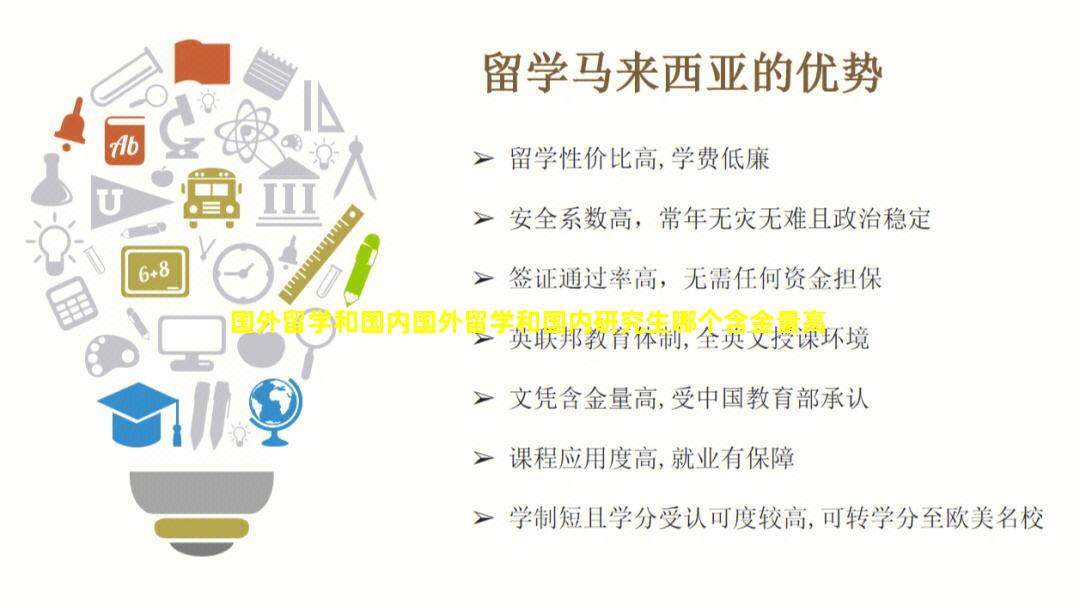 锦泰留学网
锦泰留学网
留学是指一个人离开自己的国家前往其他国家进行学习的行为。国外留学和国内留学都是学习的方式,但是存在一些不同之处。
国外留学通常是指离开自己的国家前往其他国家进行学习。这种方式可以提供更广阔的学习和生活体验,让学生能够接触不同的文化、语言和社会环境。国外留学通常需要学生适应新的生活条件,包括独立生活、适应异国文化和语言等。同时,国外留学也提供了更多的机会,可以接触到国外的优秀教育资源和先进的科研机构,有助于学生的学术和职业发展。
国内留学是指在自己的国家内进行学习。这种方式相对于国外留学来说,更加方便和经济实惠。国内留学的学生能够享受国内教育资源和福利待遇,有些学生可以选择在自己熟悉和喜欢的环境中学习,减少了适应新环境的困难。国内留学也可以更好地与国内企业接触和合作,提供更多实践机会。
无论是国内留学还是国外留学,选择应该根据个人的条件和目标来决定。国外留学通常需要一定的财力和时间投入,而国内留学则更加便利和经济实惠。但无论选择哪种方式,都可以提供一个学习和成长的机会,为个人的职业和人生发展打下基础。
国外留学和国内研究生都具有一定的含金量,但具体哪个含金量高取决于个人的需求和目标。以下是一些比较:
1.学术水平:国外留学机会更多,能够接触到世界顶尖的学术资源和研究团队,有助于提升学术水平。国内研究生虽然也有一定的研究机会,但相对来说可选择性较小。
2.认可度:国外留学在全球范围内的认可度较高,有助于在国际学术界和企业界获得更多机会。国内研究生对国内学术界和企业界的认可度较高。

3.语言能力:国外留学需要具备一定的外语能力,尤其是英语。如果已经具备较好的英语水平,国外留学可以更好地发展语言能力。国内研究生可以使用自己的母语进行学习和研究。
4.就业机会:国外留学可以提供更广泛的跨国企业就业机会,并有可能获得更高的起薪。国内研究生则可以更好地适应国内就业市场,有更多与国内企业的合作和交流机会。
5.经济压力:国外留学费用较高,还需要承担生活费、签证费等费用。国内研究生费用相对较低,并且可以申请奖学金、助学金等减轻经济压力。
国外留学和国内研究生各具优势,选择哪个取决于个人的目标和背景。如果希望获得国际化的学术和职业发展机会,国外留学可能更适合;如果对国内市场更感兴趣,或者经济压力较大,国内研究生可能更合适。
国外留学和国内985院校都有各自的优势和认可度,具体取决于个人需要和目标。以下是一些考虑因素:
1.国际化视野:国外留学可以提供更广阔的国际化视野和跨文化交流的机会,这对于将来从事国际性工作或者跨国企业有很大的帮助。国内985院校也在近年来加强国际化发展,但相较之下,国外留学更能提供与世界各地的学生和教授的交流机会。
2.教学质量和资源:国外留学通常提供先进的教学设施和资源,特别是在科研领域。一些国外大学在特定领域有着世界级的声誉,这对于一些追求学术研究的人会更有吸引力。国内985院校也在努力提升教学质量和科研水平,但整体来说,国外留学的教学质量和科研资源相对更为丰富。
3.学费和生活费用:国外留学的学费和生活费用通常较高,尤其对一些家庭经济条件有限的人来说可能是一个重要的考虑因素。国内985院校的学费相对较低,生活费用也可能相对较少。
4.语言要求和适应问题:国外留学常常需要具备一定的语言水平,以适应当地教学和生活。对于不擅长语言的人来说可能会增加适应的难度。国内985院校则使用中文授课,更适合那些习惯使用中文学习的学生。
个人应根据自己的兴趣、目标和经济状况来综合考虑国外留学和国内985院校的选择。无论选择哪种方式,关键是要努力学习和发展自己的专业能力,以及积极参与实践和社会活动,从而建立自己的优势和竞争力。
The Difference between Studying Abroad and Studying in One's Home Country
Studying abroad and studying in one's home country are two distinct educational experiences that present unique advantages and disadvantages. Let us explore the differences between these two options.
Firstly, studying abroad provides students with the opportunity to immerse themselves in a new culture and language. By living in a foreign country, students can develop a broader perspective and gain a deeper understanding of a different way of life. This exposure to diverse cultures can enhance their global awareness and intercultural communication skills, which are becoming increasingly valuable in today's interconnected world.
Secondly, studying abroad often offers a wider range of academic opportunities. Many foreign universities have established themselves as world-class institutions and are renowned for their advanced research facilities and exceptional faculty. By studying at such institutions, students can benefit from a high-quality education and exposure to cutting-edge knowledge and technologies.
On the other hand, studying in one's home country also has its advantages. Firstly, studying domestically provides a sense of familiarity and comfort. Students can remain close to their families and friends, which can provide emotional support during their studies. Additionally, studying at local universities often implies lower tuition fees and living costs compared to studying abroad, making it a more affordable option for many.
Furthermore, studying in one's home country allows students to better understand the local job market and networking opportunities. This familiarity with the local industry can give them an advantage when seeking employment post-graduation. Additionally, they have a better chance of establishing connections with professionals in their field who can mentor and guide them as they navigate their career path.
In conclusion, studying abroad and studying in one's home country each come with their own set of advantages and disadvantages. While studying abroad offers exposure to new cultures and expanded academic opportunities, studying in one's home country provides familiarity, affordable education, and localized networking opportunities. Ultimately, the choice between these two options depends on the individual's personal preferences, financial circumstances, and future goals.